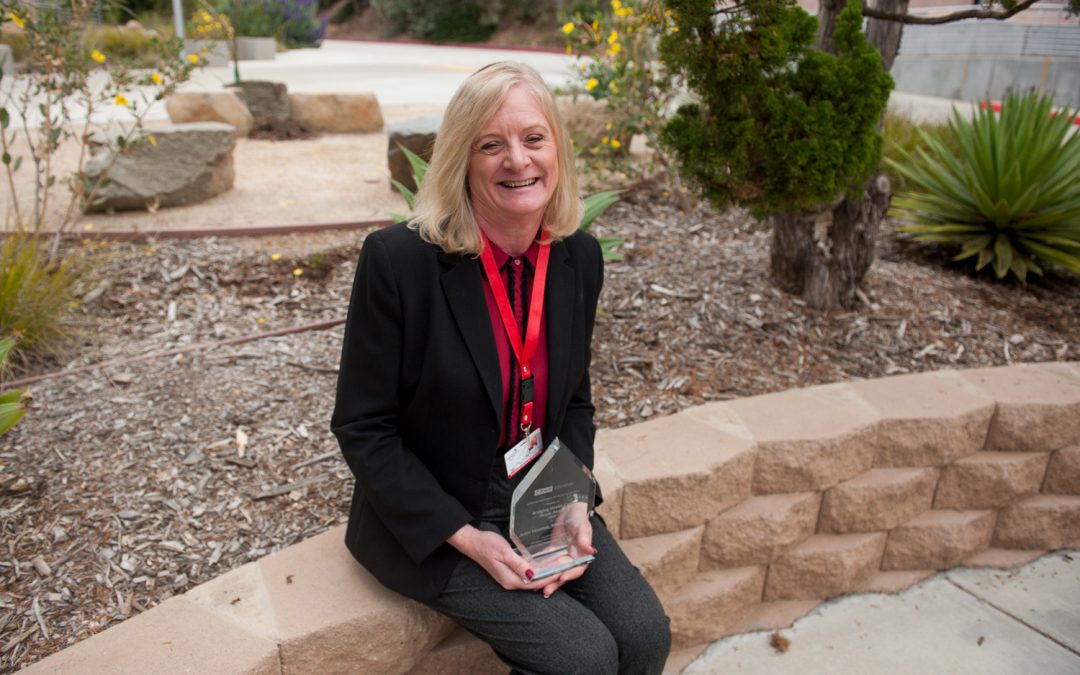As the head of the Student Health Center at Palomar College, Judy Harris has advocated for students and urged more community colleges to hire nurse practitioners to run their clinics.
SAN MARCOS — For Judy Harris, the path to Palomar College was full of dramatic twists and turns, including 23 years in the Navy and 12 years as an Embassy Medical Officer for the U.S. State Department in Africa and Central America, and at the Baghdad Embassy during the war.
But after arriving at Palomar in 2015, it didn’t take long for Harris, a Nurse Practitioner (NP), to begin advising other community colleges in the state to hire NPs as their student health directors.
For her efforts, Harris was recently awarded the Bridging Healthcare Needs award from the California Association for Nurse Practitioners (CANP), an annual honor given to “a Nurse Practitioner who is an active catalyst for positive change in the health care system.” She received the award at a CANP conference in San Diego on March 23.
By law, California community colleges must employ a nurse with at least a master’s degree to oversee their health clinics. Nurse practitioners, however, are now trained at the doctoral level, Harris explained.
The difference sounds subtle, but it makes a big difference for community colleges like Palomar that serve tens of thousands of students.
“Nurse practitioners can provide a higher level of care for students, because we can do physical exams and prescribe medication, whereas nurses can’t,” she said. “We’re actually providing more comprehensive medical services to the students.”
At Palomar, the $19-per-semester student health fee covers visits to the nurse practitioner, a doctor or a behavioral health clinician. The clinic registered 25,810 student visits in the 2016-17 fiscal year.
For example, a student with a sore throat or a cold may come into the clinic and, if necessary, leave with medication. Harris’ staff can also perform physicals and lab tests. Students needing medical specialist services may be referred to off-campus community resources, or to the college’s Behavioral Health Counseling Services, which is also under Harris’ oversight.
“Because of the way health care is, we find that a lot of students fall through the cracks,” she said. “A lot of students don’t have medical insurance or don’t know how to navigate the medical system. We’re here to advocate for the students, to get them high-quality medical care at the cheapest cost possible.
“Our other purpose here is to support them in their academic goals,” she added. “If they’re sick or not well, they’re not going to be academically successful.”
Harris spent most of the 1980s on active duty with the Navy, working in emergency rooms at naval hospitals in Long Beach and Okinawa and San Diego, before serving as Miramar College’s Student Health Director from 1997-2003.
Besides the Student Health Center at the San Marcos campus, Harris oversees the health centers at the Escondido and soon-to-open South Education Center.
She characterized the mission of any college health clinic as essential, pointing out that her staff frequently provide the first assessment for students who have a health concern.
“When they come through the door, usually it’s for an acute type of illness, but my nurses are very holistic in that they don’t just want to know about this illness, they want to know about the person as a whole,” she said.
The Student Health Center at the San Marcos campus can be reached at (760) 891-7530 and in Escondido at (760) 891-7532.

